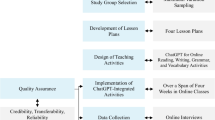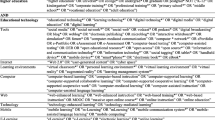Abstract
While qualitative research has shown great benefits for teachers who receive coaching, there is a paucity of experimental research examining students’ academic outcomes after their teachers received ongoing support from a knowledgeable and experienced coach. Thus, a quasi-experimental design investigated the literacy outcomes of 452 students experiencing reading learning disabilities in grades K–8th whose special education and/or resource room teachers (n = 44) received student data-focused coaching support through on-site coaching, on-demand coaching (teachers could request support if needed), or through technology-based coaching. Specifically, researchers wanted to investigate if technology-based coaching was as effective as in-classroom support for increasing teachers’ knowledge and implementation of research-based reading instructional routines and ultimately, improving the reading, writing, and spelling outcomes of students with reading learning disabilities. Results yielded positive student academic growth for all three methods of coaching; however, coaching via technology, a more efficient, less time-consuming method of giving teachers ongoing professional development, produced larger statistically significant Cohen’s d effect sizes than the other two forms of coaching ranging from 0.22 to 1.01 in areas of phonemic awareness, decoding, comprehension, fluency, writing, and spelling. Other findings as well as the educational implications of implementing coaching via technology are also included.


Similar content being viewed by others
References
Al Otaiba, S., Hosp, J., Smartt, S., & Dole, J. (2008). The challenging role of a reading coach, a cautionary tale. Journal of Educational & Psychological Consultation, 18(2), 124–155. https://doi.org/10.1080/10474410802022423.
Bean, R. M., Belcastro, B., Hathaway, J., Risko, V., Rosemary, C. & Roskos, K. (2008). A review of the research on instructional coaching. Paper presented at the American Educational Research Association Conference, New York.
Benson, B., & Campbell, H. (2009). Assessment of student writing with curriculum-based measurement. In G. A. Troia (Ed.), Instruction and assessment for struggling writers: Evidence-based practices (pp. 337–353). New York: Guilford.
Berninger, V. W., Abbott, R. D., Vermeulen, K., & Fulton, C. M. (2006). Paths to reading comprehension in at-risk second-grade readers. Journal of Learning Disabilities, 39(4), 334–351.
Borko, H. (2004). Professional development and teacher learning: Mapping the terrain. Educational Researcher, 33(8), 3–15.
Brown, D., Reumann-Moore, R., Hugh, R., Christman, J. B., Riffer, R., duPlessis, P., et al. (2007). Making a difference: Year two report of the Pennsylvania high school coaching initiative. Philadelphia: Research for Action.
Capizzi, A. M., & Fuchs, L. S. (2005). Effects of curriculum based measurement with and without diagnostic feedback on teacher planning. Remedial and Special Education, 26, 159–174.
Cassidy, J., & Cassidy, D. (2008). What’s hot for 2008. Reading Today, 25(4), 1, 10–11.
Conte, K. L., & Hintze, J. M. (2000). The effects of performance feedback and goal setting on oral reading fluency within curriculum-based measurement. Diagnostique, 25(2), 85–98.
Denton, C. A., & Hasbrouck, J. (2009). A description of instructional coaching and its relationship to consultation. Journal of Educational and Psychological Consultation, 19(2), 150–175. https://doi.org/10.1080/10474410802463296.
ESSA (2015) Every Student Succeeds Act, 20 U.S.C. § 6301 et seq.
Fisher, D., Frey, N., & Lapp, D. (2011). Coaching middle-level teachers to think aloud improves comprehension instruction and student reading achievement. The Teacher Educator, 46(3), 231–242. https://doi.org/10.1080/08878730.2011.580043.
Foorman, B. R., & Torgesen, J. (2001). Critical elements of classroom and small group instruction promote reading success in all children. Learning Disabilities Research & Practice, 16, 203–212.
Fuchs, D., Fuchs, L. S., & Compton, D. L. (2004). Identifying reading disabilities by responsiveness-to-intervention: Specifying measures and criteria. Learning Disability Quarterly, 27(4), 216–227.
Garbacz, S. A., Lannie, A. L., Jeffery-Pearsall, J. L., & Truckenmiller, A. J. (2015). Strategies for effective classroom coaching. Preventing School Failure, 59(4), 263–273.
Gentry, L. B., Denton, C. A., & Kurz, T. (2008). Technology-based mentoring provided to teachers: A synthesis of the literature. Journal of Technology and Teacher Education, 16(3), 339–373.
Good, R. H. III, & Kaminski, R. A. (2011). Dynamic indicators of basic early literacy skills. Next. Eugene, OR: Dynamic Measurement Group.
Good, R. H., Simmons, D. C., & Kame’enui, E. J. (2001). The importance and decision making utility of a continuum of fluency-based indicators of foundational reading skills for third-grade high stakes outcomes. Scientific Studies of Reading, 5, 257–288.
Hamilton, L., Halverson, R., Jackson, S., Mandinach, E., Supovitz, J., & Wayman, J. (2009). Using student achievement data to support instructional decision making (NCEE 2009-4067). Washington, DC: National Center for Education Evaluation and Regional Assistance, Institute of Education Sciences, U.S. Department of Education.
Hasbrouck, J., & Denton, C. A. (2005). The reading coach: A how-to manual for success. Longmont, CO: Sopris West.
Hosp, M. K., Hosp, J. L., & Howell, K. W. (2007). The ABCs of CBM: A practical guide to curriculum-based measurement. New York: Guilford Press.
Ingersoll, R., Merrill, L., & Stuckey, D. (2018). The changing face of teaching. Educational Leadership: Bolstering the Teacher Pipeline, 75(8), 44–49.
Israel, M., Carnahan, C. R., Snyder, K. K., & Williamson, P. (2012). Supporting new teachers of students with significant disabilities through virtual coaching: A proposed model. Remedial and Special Education, 34(4), 195–204.
Kalinowski, K. Mathes, P. G., Torgesen, J. K., & Herron, J (2009). Continuous progress monitoring of reading growth using computer adaptive testing (Technical Report #3). Dallas, TX: Istation. Retrievable from https://www.istation.com/Content/downloads/studies/isip_rr.pdf.
Knight, J. (2004). Instructional coaches make progress through partnership: Intensive support can improve teaching. Journal of Staff Development, 25(2), 32–37.
L’Allier, S. K., Elish-Piper, L., & Bean, R. M. (2010). What matters for elementary literacy coaching? Guiding principles for instructional improvement and student achievement. The Reading Teacher, 63, 544–554.
Larsen, S. C., Hammill, D. D., & Moats, L. (2013). Test of written spelling (5th ed. (TWS-5) ed.). Austin, TX: PRO-ED.
Lockwood, J. R., McCombs, J. S., & Marsh, J. (2010). Linking reading coaches and student achievement: Evidence from Florida middle schools. Educational Evaluation and Policy Analysis, 32(3), 372–388. https://doi.org/10.3102/0162373710373388.
MacGinitie, W., & MacGinitie, R. (1989). Gates-MacGinitie reading tests (3rd ed.). Itasca, IL: Riverside.
Neufeld, B., & Roper, D. (2003). Coaching: A strategy for developing instructional capacity—Promises and practicalities. Washington, DC: Aspen Institute Program on Education.
Ruble, L., Dalrymple, N., & McGrew, J. (2012). The collaborative model for promoting competence and success for students with ASD. New York, NY: Springer.
Ruble, L. A., McGrew, J. H., Toland, M. D., Dalrymple, N. J., & Jung, L. A. (2013). A randomized controlled trial of COMPASS web-based and face-to-face teacher coaching in autism. Journal of Consulting and Clinical Psychology, 81(3), 566–572. https://doi.org/10.1037/a0032003.
Russo, A. (2004). School-based coaching: A revolution in professional development—Or just the latest fad? Harvard Education Letter, 20(4), 1–4.
Stecker, P., Fuchs, L., & Fuchs, D. (2005). Using curriculum-based measurement to improve student achievement: Review of research. Psychology in the Schools, 42(8), 795–819.
Stephens, D., Morgan, D., Donnelly, A., DeFord, D., Young, J., Seaman, M., ... & Cibic, R. (2007). The South Carolina Reading Initiative: NCTE Reading Initiative as a statewide staff development project. Urbana, IL: National Council of Teachers of English. http://www.ncte.org/magazine/perspectives/scrireport. Accessed 7 February 2017.
Torgesen, J. K., Wagner, R. K., & Rashotte, C. A. (2012). Test of word reading efficiency (2nd ed. (TOWRE-2)). Austin, TX: PRO-ED.
Vanderburg, M., & Stephens, D. (2010). The impact of literacy coaches: What teachers value and how teachers change. The Elementary School Journal, 111(1), 141–163.
Vernon-Feagans, L., Bratsch-Hines, M., Varghese, C., & Bean, A. (2015). The targeted reading intervention: Face-to-face vs. webcam literacy coaching of classroom teachers. Learning Disabilities Research & Practice, 30(3), 135–147.
Vernon-Feagans, L., Kainz, K., Amendum, S., Ginsberg, M., Wood, T., & Bock, A. (2012). Targeted reading intervention: A coaching model to help classroom teachers with struggling readers. Learning Disabilities Quarterly, 35(2), 102–114. https://doi.org/10.1177/0731948711434048.
Wagner, R., Torgesen, J., & Rashotte, C. (1999). Comprehensive test of phonological processing (CTOPP). Austin, TX: PRO-ED.
Wood, C. L., Goodnight, C. I., Bethune, K. S., Preston, A. I., & Cleaver, S. L. (2016). Role of professional development and multi-level coaching in promoting evidence-based practice in education. Learning Disabilities: A Contemporary Journal, 14(2), 159–170.
Woodcock, R. W., McGrew, K. S., & Mather, N. (2001). Woodcock-Johnson III tests of achievement (WJ-III). Itasca, IL: Riverside Publishing.
Acknowledgement
This Technology and Media Services for Individuals with Disabilities project (no. H327S120018) was grant-funded by the Office of Special Education (OSEP) under the U.S. Department of Education (USDE) in Washington, D.C. While OSEP funded this project, the statements in this manuscript do not necessarily represent the views or beliefs of OSEP or USDE. The authors do not have any ownership in the Hoot Education Platform or Istation’s Indicators of Progress and are not profiting in any form from the sales of subscriptions or writing this manuscript.
Author information
Authors and Affiliations
Corresponding author
Additional information
Publisher’s Note
Springer Nature remains neutral with regard to jurisdictional claims in published maps and institutional affiliations.
Rights and permissions
About this article
Cite this article
Weiser, B., Buss, C., Sheils, A.P. et al. Expert reading coaching via technology: Investigating the reading, writing, and spelling outcomes of students in grades K–8 experiencing significant reading learning disabilities. Ann. of Dyslexia 69, 54–79 (2019). https://doi.org/10.1007/s11881-018-00175-1
Published:
Issue Date:
DOI: https://doi.org/10.1007/s11881-018-00175-1




